Understanding GCWR: What Does it Mean?
Master GCWR meaning for waste management. Understand it's vital role in fleet safety, compliance, & efficiency. Also learn the difference between GCWR and GVWR.
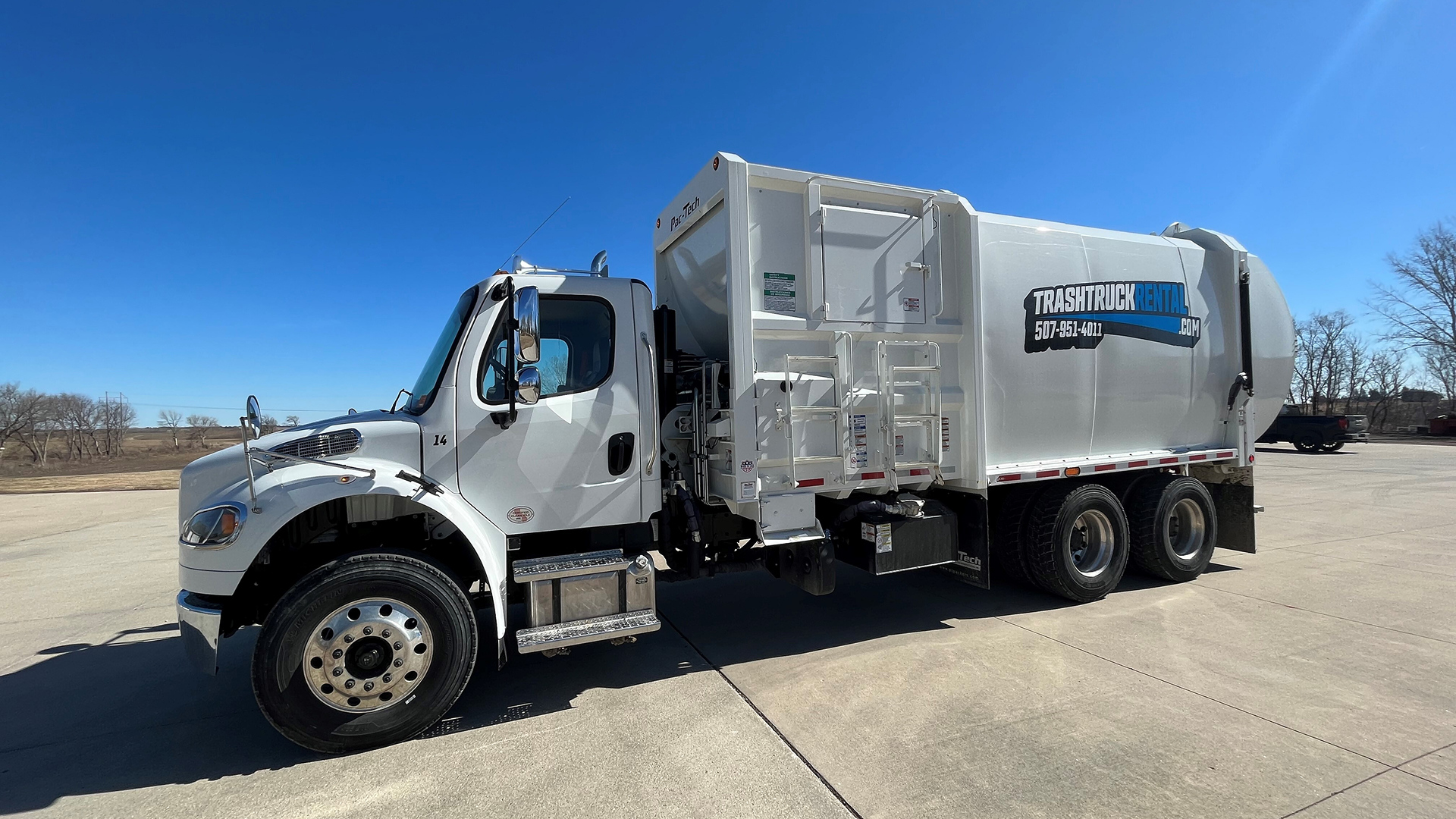
Master GCWR meaning for waste management. Understand it's vital role in fleet safety, compliance, & efficiency. Also learn the difference between GCWR and GVWR.

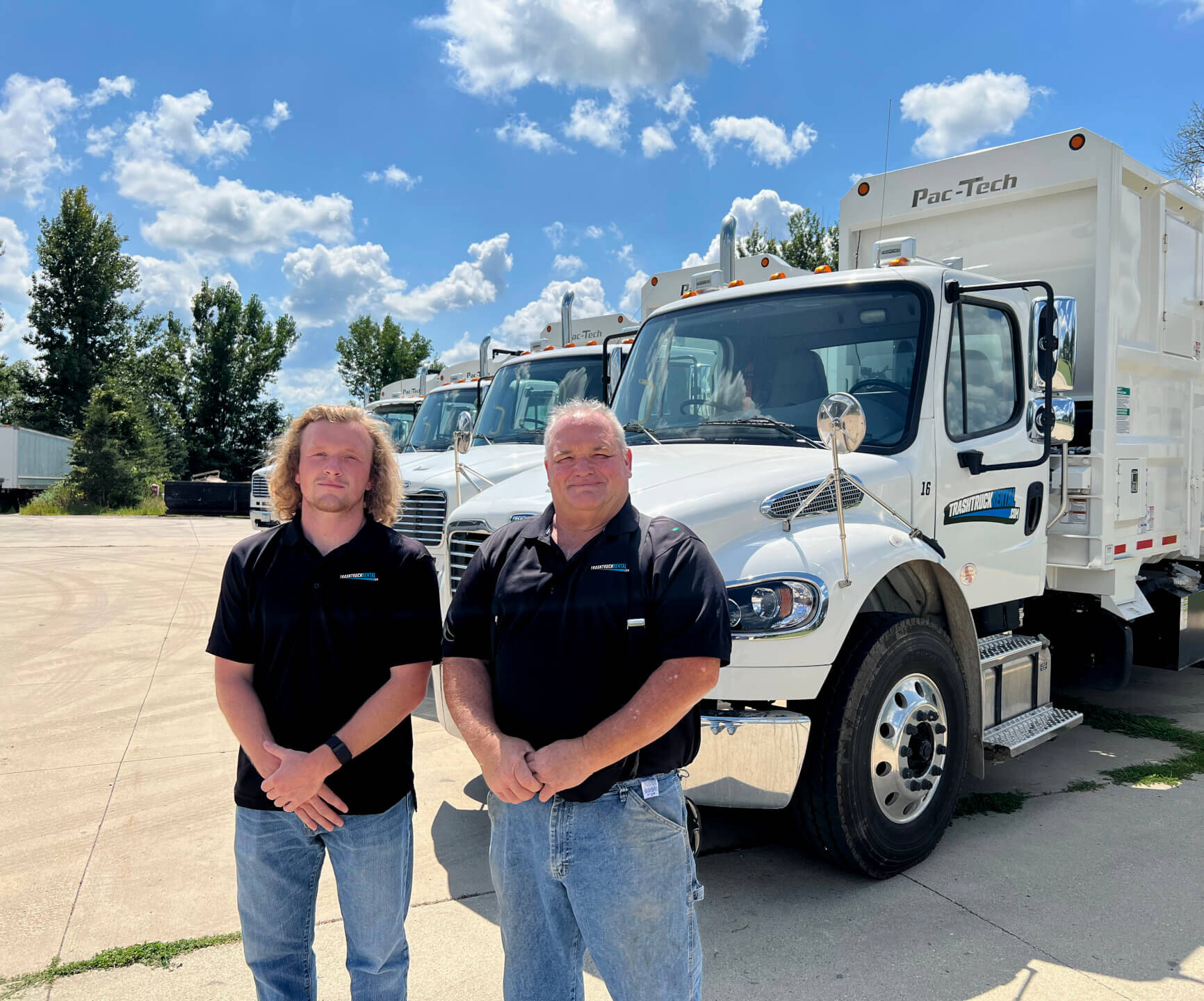
Running a fleet in the waste management industry isn't easy. You're juggling tight deadlines, evolving regulations, rising operational costs, and the constant demand to keep vehicles safe, compliant, and on the road. When it comes to hauling heavy loads, even a single miscalculation can lead to serious consequences, such as unexpected fines, equipment breakdowns, or increased safety risks for your crew.
One of the most overlooked yet critical factors in fleet safety and compliance is GCWR, or Gross Combined Weight Rating. It's more than just a technical specification; it plays a direct role in how efficiently and safely your fleet operates. Overloaded vehicles are responsible for over 5% of commercial accidents, often due to a lack of awareness around weight ratings like GCWR.
Whether you're a CEO seeking to enhance fleet performance, a COO prioritising risk management, or a fleet manager under pressure to minimise downtime, understanding GCWR is crucial. It can be the difference between smooth operations and costly disruptions.
In this guide, we'll explain what GCWR means, why it matters to your business, and how mastering it can help you make more innovative, safer, and more cost-effective decisions for your fleet.
Gross Combined Weight Rating (GCWR) refers to the maximum allowable weight of a fully loaded truck and its attached trailer. This includes everything: cargo, passengers, fuel, and any equipment in tow. GCWR is set by the vehicle manufacturer and must be strictly followed. It is not a guideline but a legal and mechanical limit.
Think of GCWR as your fleet’s non-negotiable limit. It should serve as the foundation for every route you plan and every load you carry. By adhering to it, you:
Example: If your truck’s GCWR is 25,000 lbs and the truck itself weighs 10,000 lbs, you can tow up to 15,000 lbs with the trailer cargo included. It's simple math with a massive impact.
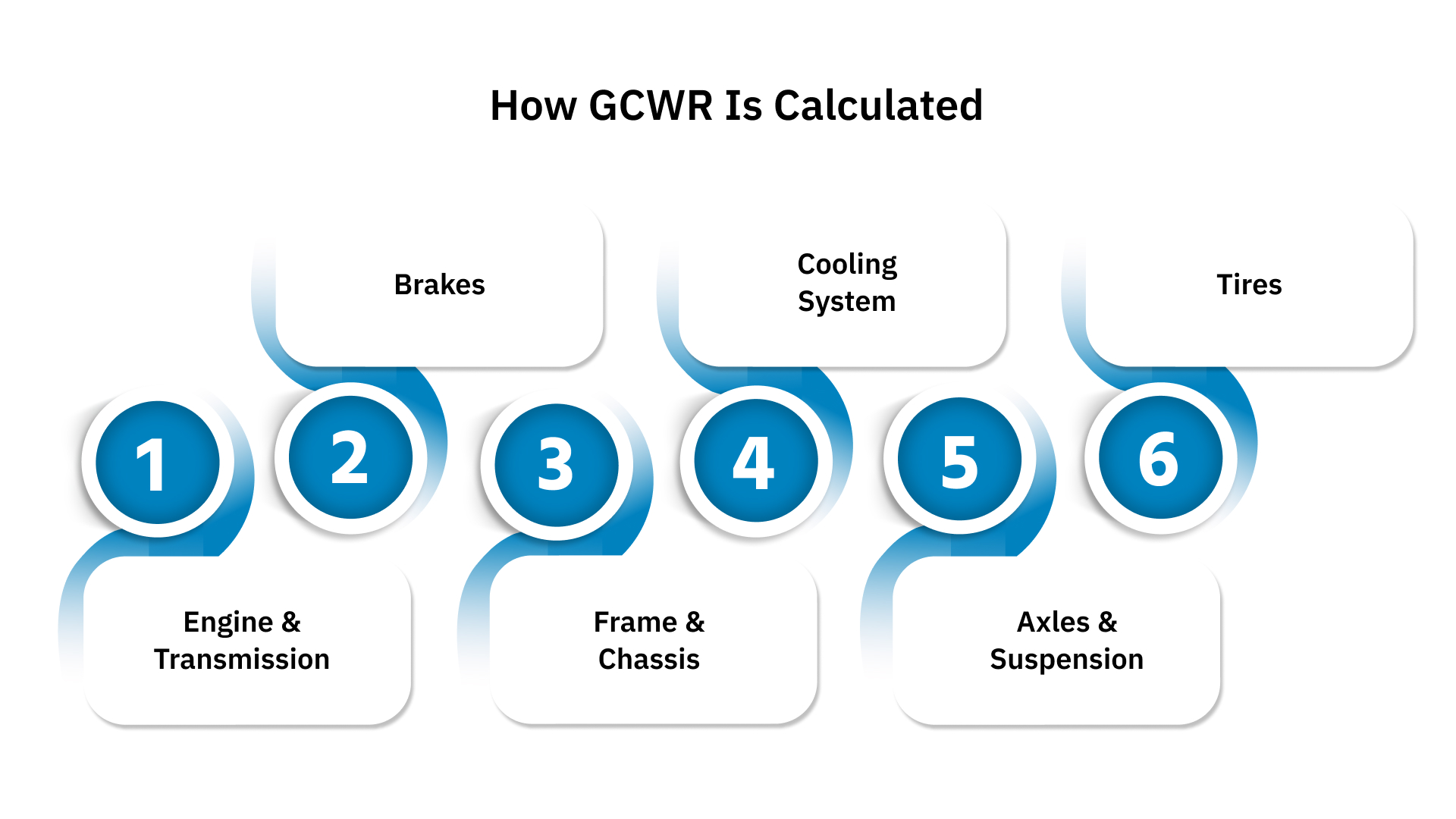
The GCWR isn’t a guess or a rule made by a government agency. It’s a specific number set by the truck’s manufacturer. They determine this limit based on the truck's construction and its safe handling capabilities. Manufacturers conduct tests and utilize engineering data to determine this number. When you follow the GCWR, you’re using the truck the way it was designed to be used. Ignoring it means pushing the truck beyond its safe limits, which puts your equipment and team at risk.
Ever wondered what goes into determining this critical limit? It's all about strength and safety, directly impacting your company's assets and bottom line. GCWR is based on how much weight your truck and trailer can safely handle together. The manufacturer sets this limit by looking at the weakest part of the system. Here’s what they consider:
GCWR depends on the part most likely to fail under stress. That’s why it’s essential to stay within the limit. Now that you understand how GCWR is calculated, it’s important to see how it compares to GVWR. Knowing the difference between the two helps you better manage vehicle safety and load capacity.
When managing commercial vehicles, you need to understand two key weight limits: GVWR and GCWR. They serve different purposes, and confusing them can lead to serious compliance and safety issues.
In short, GVWR refers to the truck alone; GCWR refers to the truck-trailer combination. Mixing them up can overload your rig, damage components, and result in fines or downtime. Always check both before you hit the road, and don't mix them up, as understanding both is non-negotiable for safe and compliant fleet management.
GCWR Vs. GVWR
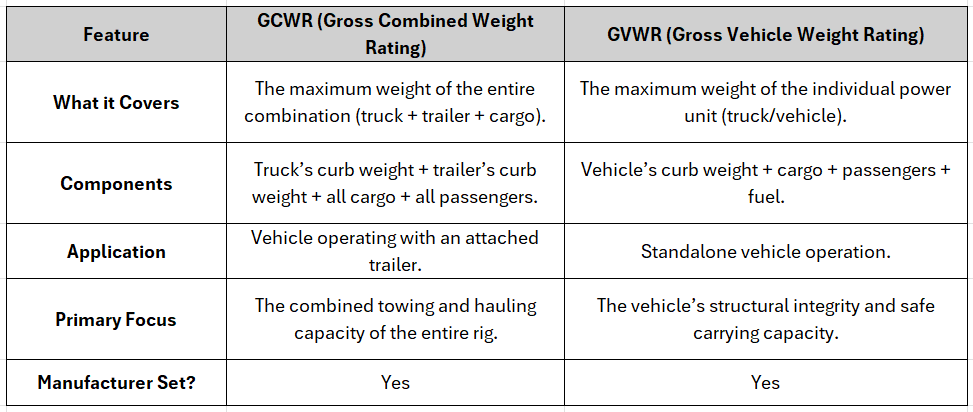
With the differences clear, let’s focus on how GCWR directly affects your waste management operations and why it’s so important in the field.
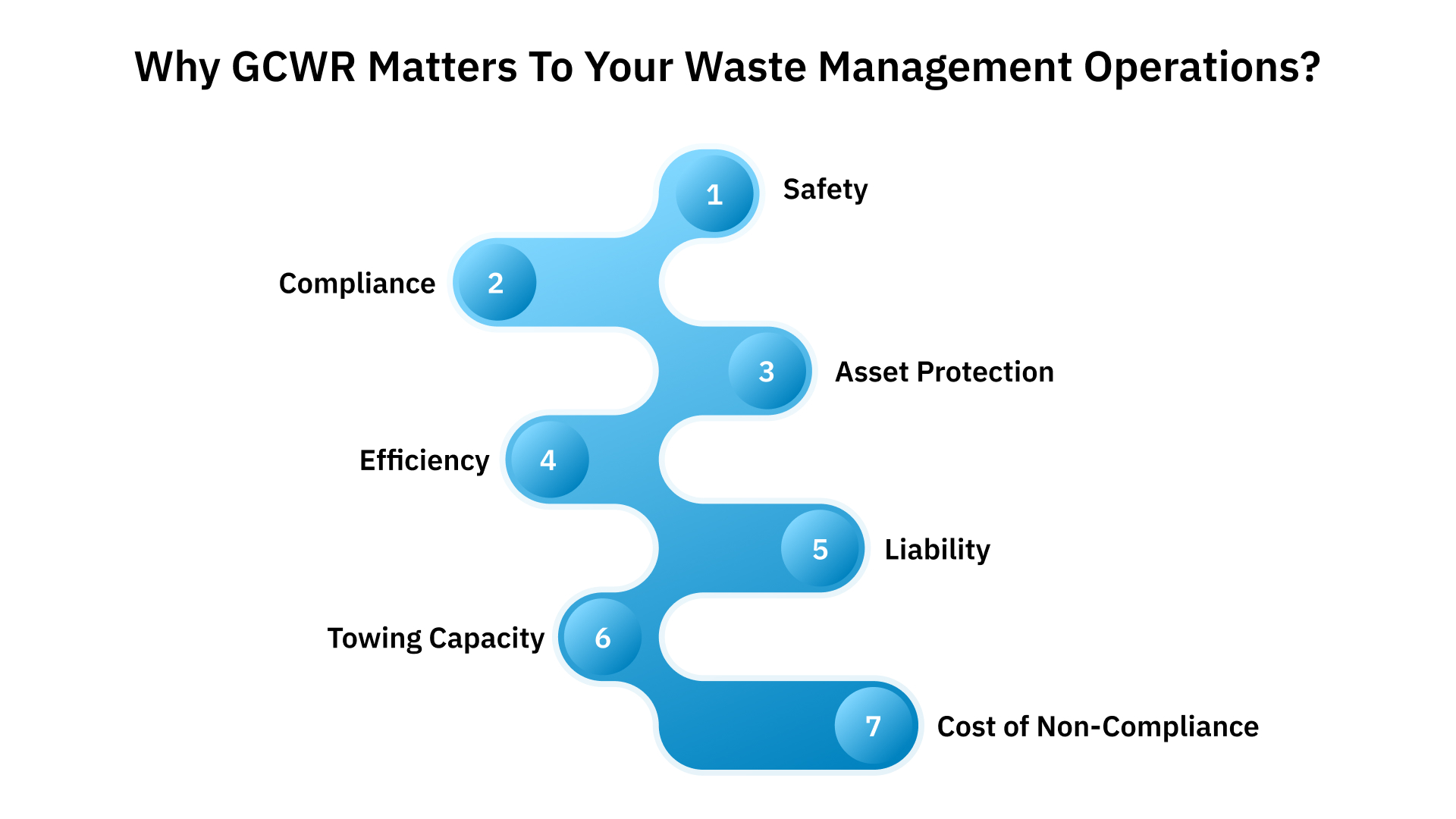
Knowing your truck’s GCWR isn’t just about following rules; it directly affects safety, costs, and reliability.
If you're managing waste fleets, adhering to GCWR isn't just essential; it's a strategic advantage. This commitment to compliance and safety begins with dependable equipment. Trash Truck Rental is dedicated to delivering dependable, meticulously maintained, GCWR-compliant trucks to meet your fleet's needs.
Also Read: A Guide to Expanding Waste Management Services: Renting for Growth
Now that you understand why GCWR is important for your operations, the next step is knowing how to find it. Here's how to locate your truck’s GCWR and what to look for.
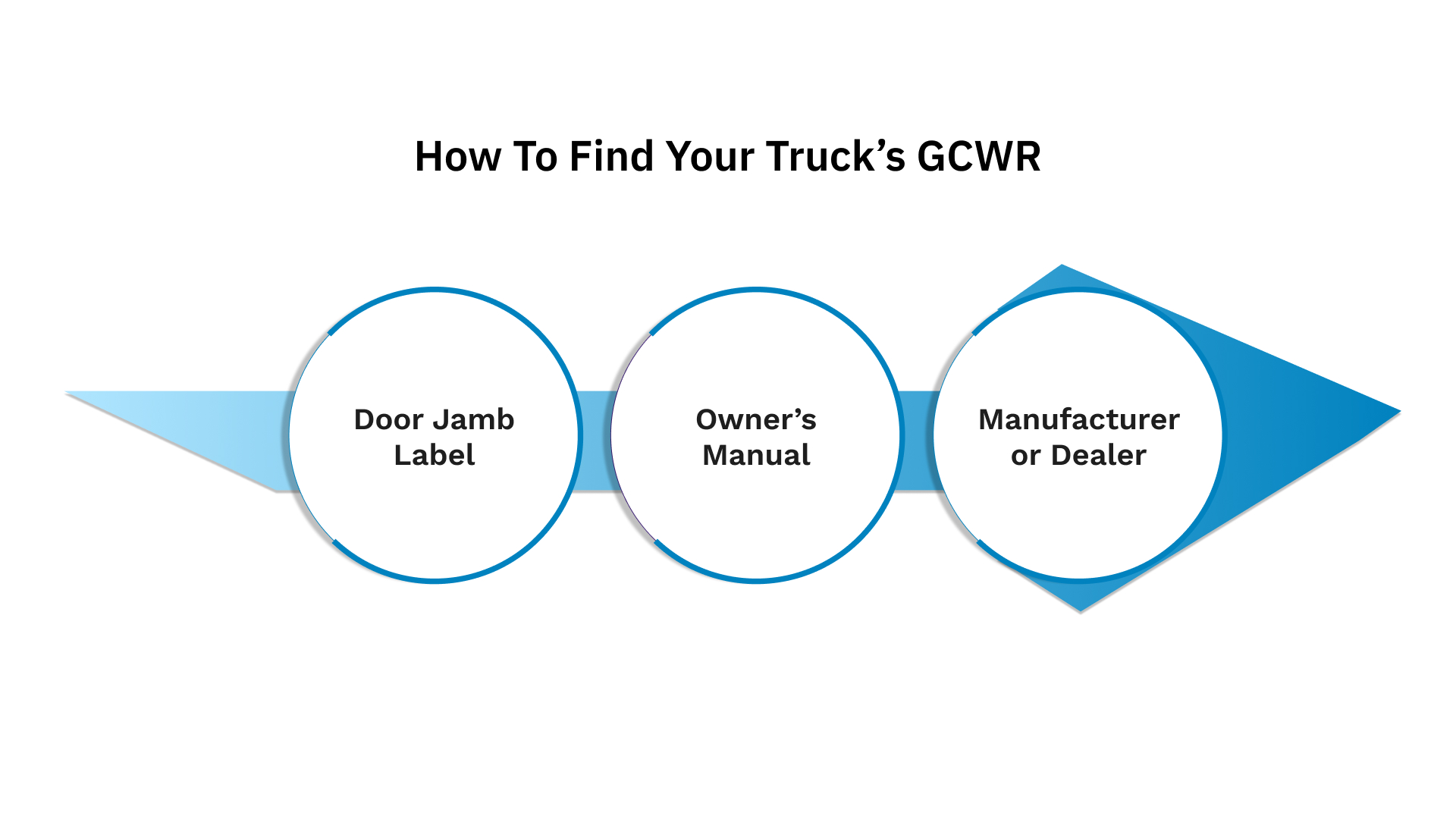
To stay compliant, you need to know your truck’s exact GCWR. Here’s where to look:
Make sure the GCWR matches your truck’s exact setup; different trims or options can change the rating.
While it’s always best to obtain the official GCWR from your truck’s manufacturer, sometimes that data isn’t easily accessible, especially on older or custom vehicles. If that’s the case, you can use a basic formula to make a temporary estimate.
Example:
GVWR = 12,000 lbs
Towing Capacity = 18,000 lbs
Estimated GCWR = (12000 + 18000) = 30,000 lbs
Note: This is only a rough estimate. The official GCWR accounts for factors such as frame strength, braking, and engine durability. Use this method only if official specifications are unavailable, and try to obtain the actual number as soon as possible.
While understanding GCWR is essential for safe and compliant operations, aligning your fleet with those standards can be complex. Whether you're having trouble finding accurate ratings for older vehicles or need a fleet that’s built to support compliance from the start, Trash Truck Rental is here as your expert resource.
At Trash Truck Rental our top priority is supporting your waste management operations with solutions that enhance efficiency, compliance, and budget control. Whether you require equipment for short-term needs or long-term fleet planning, our expertise ensures you receive reliable and flexible solutions.
We serve both municipal and private haulers across the Midwest, including Minnesota, Wisconsin, and Iowa, and offer nationwide used truck sales across the United States, ensuring access to dependable equipment wherever you operate. Our commitment to cleaner, safer communities is reflected in every meticulously maintained, GCWR-compliant truck we rent or sell, helping your fleet contribute to safer roads and healthier environments.
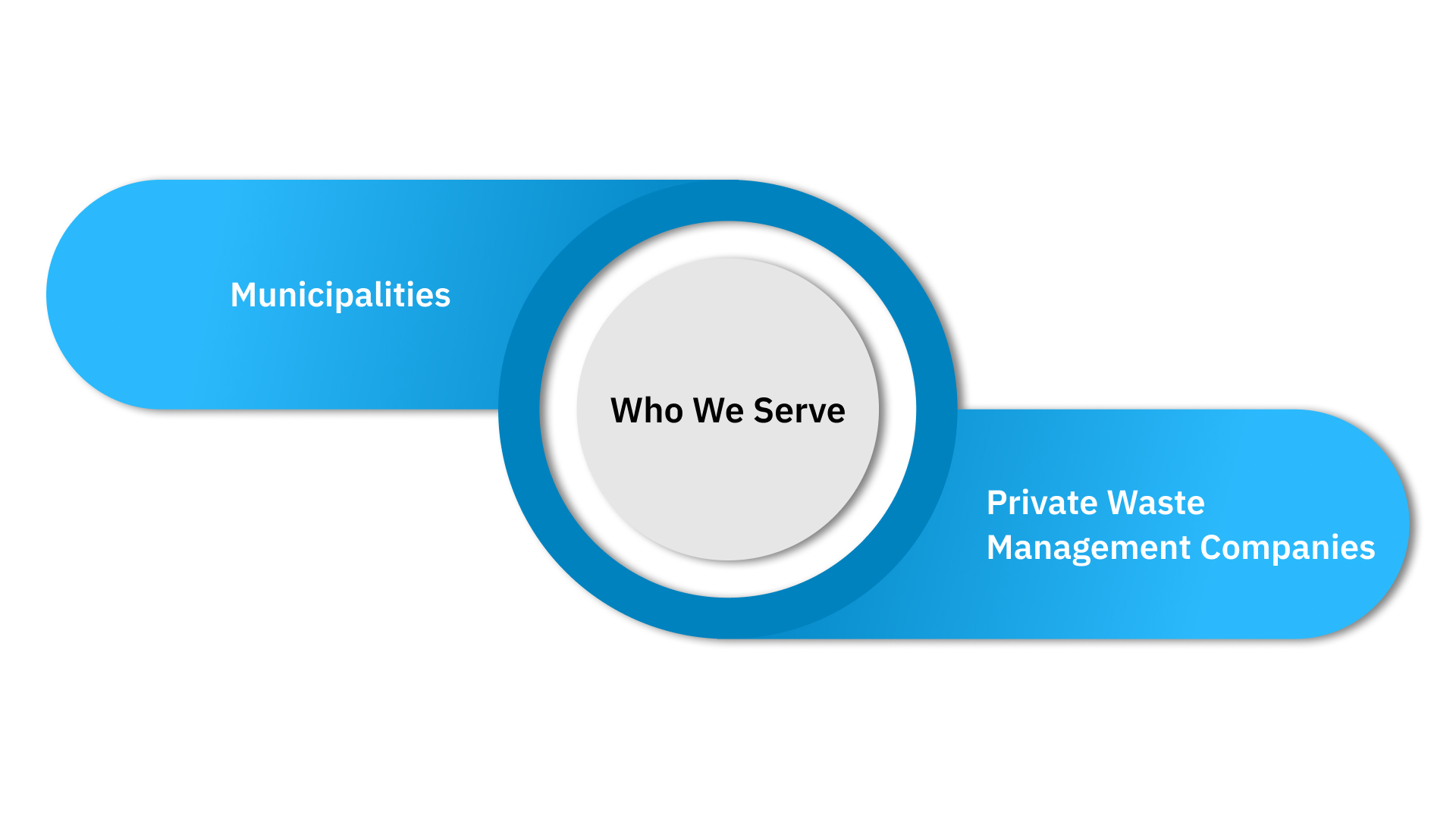
We serve both municipalities and private waste management companies, offering tailored solutions to meet the unique demands of public sanitation departments and private haulers alike:
Whether you’re managing city routes or running a private fleet, we provide the right trucks and responsive support to keep your operations moving. We adhere to rigorous maintenance schedules and transparent communication protocols to uphold the highest standards in all our operations.
Tired of compliance worries or unpredictable fleet performance? Our team is ready to provide the precise, GCWR-compliant truck solutions you need. Let's connect today to eliminate operational guesswork and secure your fleet's efficiency!
Also Read: Freeze-Proof Your Fleet: How Renting Garbage Trucks Can Save Small Haulers from Winter Woes
Understanding GCWR isn't just knowledge; it's your most powerful tool against common operational risks. By mastering your weight limits, you proactively avoid costly fines, prevent breakdowns, and significantly enhance safety across your fleet. This vital insight enables you to keep your operations running confidently and profitably.
At Trash Truck Rental, we’re here to support that effort. We offer well-maintained garbage trucks for rent or sale, backed by flexible terms and responsive service. Whether you’re operating locally or need a dependable truck across the U.S., choosing a truck with the right GCWR helps ensure safety, legal compliance, and dependable performance under load.
We provide solutions that help you stay on schedule and within budget due to our competitive pricing. Our friendly and proactive customer service support team is available via sales@trashtruckrental.com and phone ( 507-951-4011), with most queries answered within 24 hours. We offer personalized solutions tailored to your unique needs.
By prioritizing GCWR and making smart equipment choices with Trash Truck Rental, you’re not just optimizing your operations or building a stronger fleet. You are actively contributing to cleaner, healthier, and safer communities, ensuring a better quality of life for residents on every route your trucks travel. This is how we collectively build a better, safer road ahead. Get a quote today
GCWR (Gross Combination Weight Rating) is the maximum weight your truck can handle safely. This includes the truck, passengers, cargo, and any trailer being towed.
GVWR covers just the truck and its load. GCWR includes the truck plus the trailer and everything inside both.
You can check the owner’s manual, the label inside the driver’s door, the manufacturer’s website, or a towing guide.
Going over the GCWR can lead to brake problems, damage to parts like the transmission, legal trouble, and higher safety risks. Always stay within the limit to keep your truck safe and running well.
Ready to Upgrade Your Process Operations?